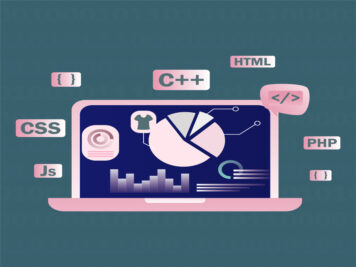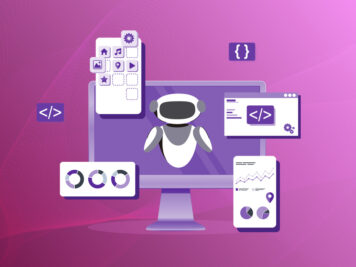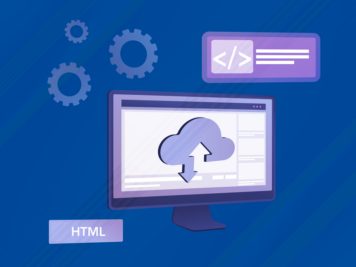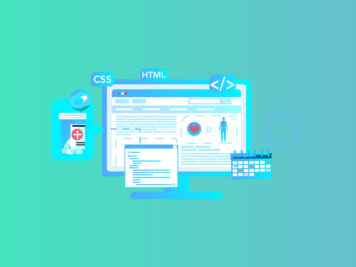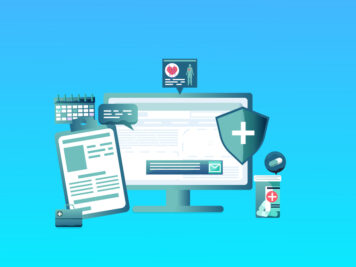When did your development team last enjoy a peaceful day? For most health care organizations, those days are few and far between. Development teams are juggling a never-ending series of requests — from keeping electronic health records (EHRs) up and running and operating telehealth platforms to keeping systems secure against a backdrop of rising cyberattacks. And then there’s compliance. With HIPAA and FDA regulations hanging over their heads, even minor slip-ups can have major consequences.
So, what is the strategy? Hire more people? Build in-house expertise? Easier said than done. Healthcare AI engineers, cybersecurity experts, and compliance specialists are hard to find. The competition for talent is fierce, and hiring is rarely quick.
That’s why most healthcare businesses are looking to healthcare software development outsourcing. Not as an act of desperation to cut costs, but as a business decision. It’s about accessing the right mix of people, the right tech, and the right expertise — without holding out for the perfect candidate or stretching your internal staff to breaking point.
However, outsourcing, like any other option, comes with certain risks. Choosing the wrong partner risks missing deadlines, receiving substandard products, or facing regulatory compliance issues. However, if done right, it offers a shortcut to creativity, resilience, and growth.
Let’s explore when healthcare software development makes sense, the challenges it addresses, and how to make it work for your business.
When is it ideal to outsource healthcare software development?
There is no single formula for outsourcing healthcare software development. But there are some scenarios where it makes sense to bring in outside expertise.
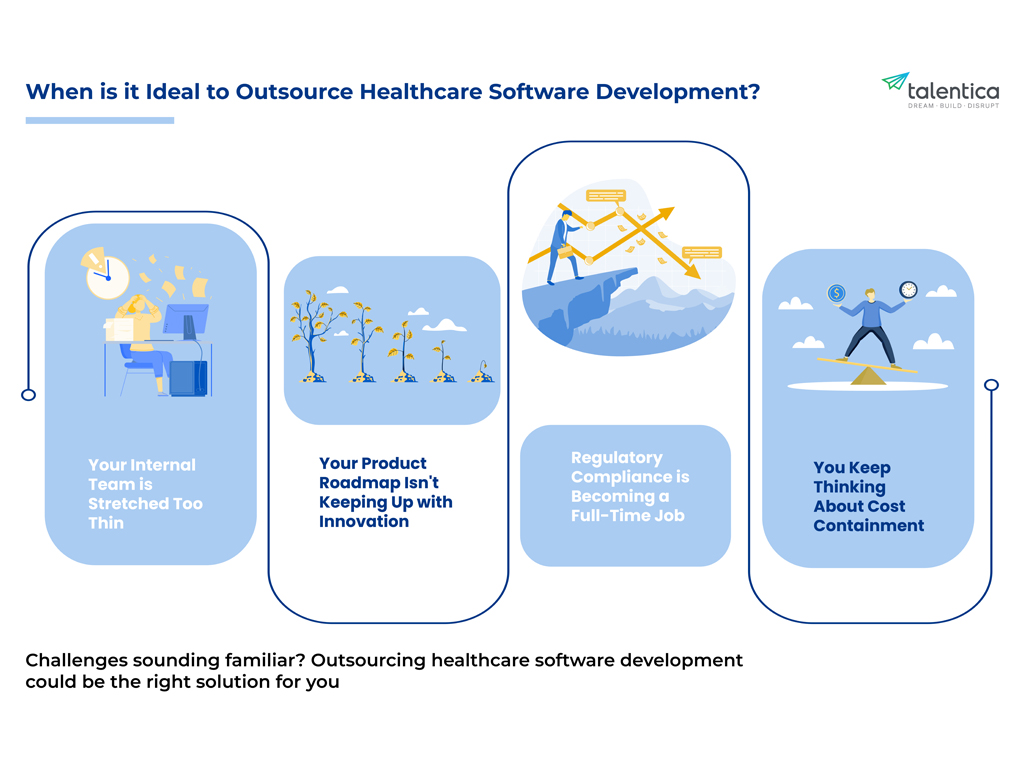
Your internal team is stretched too thin
If you ask any healthcare CTO what keeps them up at night, the “talent shortage” likely leads the list. There’s a tremendous need for talent in interoperability, cybersecurity, and artificial intelligence, but the supply just can’t catch up.
Deloitte’s 2025 survey reported that over half (58%) of healthcare executives expect workforce issues, including skills gaps and the necessity to upskill. Additionally, those who are able to create successful internal teams tend to have trouble retaining employees. Healthcare firms are stuck in a continual cycle of recruitment and hiring as a result of Big Tech’s capability to entice talented employees with enticing offers.
Healthcare software development outsourcing addresses this demand. You can readily get experienced engineers and subject matter specialists by collaborating with external teams. Whether it’s modernizing old systems or developing an AI-based diagnostic tool, outsourcing removes the burden of putting work on hold to find the perfect person.
Your product roadmap isn’t keeping up with innovation
Let’s face it. Healthcare has gone beyond mere treatment. It’s all about creating amazing patient experiences using intuitive digital solutions. There is a big demand for end-to-end digital integration, ranging from AI-based chatbots to handle patient queries to remote monitoring solutions that provide real-time information.
But innovation isn’t without challenges. Internal teams are over-burdened, struggling to meet new product development requirements and maintenance needs. Delays are inevitable, with a corresponding impact on time-to-market.
Outsourcing partners often employ agile methodologies to bring about faster development without compromising quality. By splitting the workload, outsourced teams can do engineering, testing, and implementation, leaving in-house teams free to concentrate on strategic goals.
As an example, say a US-based healthcare technology company wishes to go to market within six months with remote patient monitoring software. Instead of employing its own staff to develop it, it outsources development out to talented engineers who’ve created similar ones before. Outcome? Lower expense, quicker roll-out, and a competitive lead.
Regulatory compliance is becoming a full-time job
Strict regulations in the healthcare industry serve a purpose. The trust that patients have placed in you with their most intimate data could be lost by any type of data breach. In the United States, laws like HIPAA, HITECH, and FDA regulations monitor the gathering, storing, and distribution of medical information.
Your outsourcing partners can handle this for you if you do proper selection. There are various healthcare software development offshore companies that have expertise in developing regulatory-compliant applications. They will apply security measures such as audit trails, access control, and encryption to become regulation compliant right from the first day.
Expert Tip:
During selection of possible partners, ask:
- Do they have a history of creating HIPAA-compliant solutions?
- How do they maintain data privacy and security?
- What is their incident response plan in the case of a data breach?
The ideal outsourcing healthcare software development partner won’t just build software, they will build trust.
You keep thinking about cost containment
It’s a valid concern, and for good reason. Healthcare budgets are generally very tight, particularly for nonprofits and smaller clinics. In-house software development entails infrastructure, licensing, and maintenance expenses, as well as salaries.
Outsourcing offers a more predictable cost structure. Firms can choose contract models that fit their needs, like time-and-materials agreements, fixed-price contracts, or dedicated teams, instead of having to bear all the development expense. This flexibility minimizes the financial risk and makes planning easier.
The numbers don’t lie either. The global healthcare IT outsourcing industry will have reached $122.72 billion in value by 2032 from its current value of $64.52 billion in 2023. Why? Because companies are experiencing improved regulatory compliance, fewer issues, and faster rollouts.
But even with all these advantages of healthcare software development outsourcing, one question often lingers.
Isn’t outsourcing healthcare software development risky for sensitive patient data?
It’s a valid concern. After all, there have been some reported cases of data security violations in the healthcare sector. However, experienced healthcare software development outsourcing partners are aware of the risks. They are better placed to put in place strong security protocols, having done it for other organizations. In fact, 60% of healthcare organizations, according to a Deloitte survey, wish to double their investment in cybersecurity by 2025, and many opt to appoint outside experts.
Indeed, many of the best outsourcing companies offer dedicated healthcare cybersecurity teams. They perform regular security audits, encrypt data in transit and at rest, and follow zero-trust models to authenticate access at every level. Some even use AI for immediate detection and neutralization of threats.
Even Pankaj Mendki, our head of Emerging Technology, highlights the value of confidential computing. According to him, this technology can help healthcare companies protect patient data at every stage of its lifecycle, strengthening conventional encryption and protecting private data during processing.
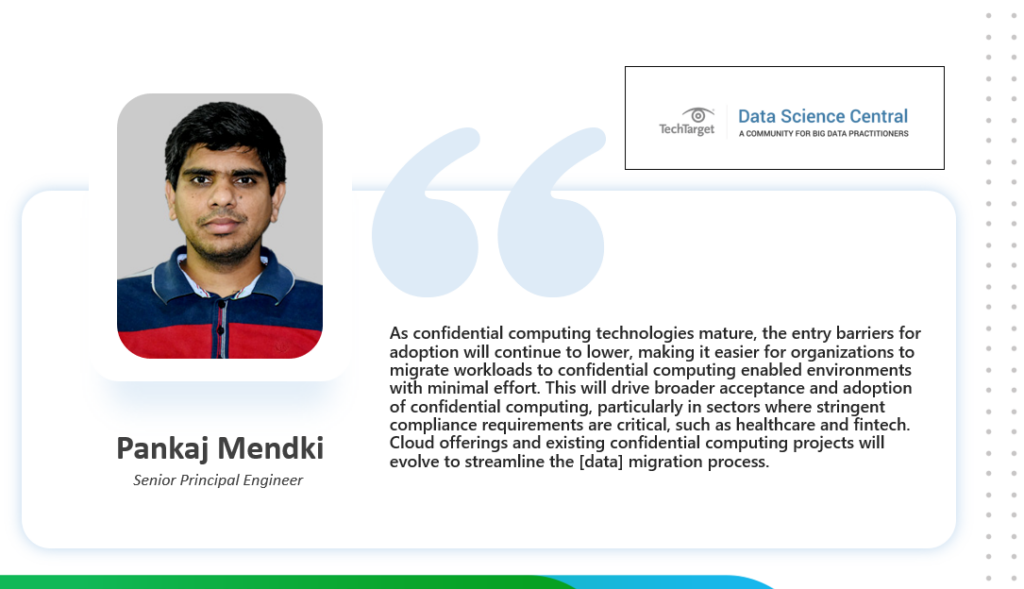
So now what are you thinking?
Is outsourcing healthcare software development the right move for you?
One thing is for sure: outsourcing doesn’t equate to losing control. It’s essential to identify your strengths and the areas where an expert can help you improve.
Maybe your internal team is brilliant at building patient-facing apps but lacks the compliance muscle. Maybe you’re launching a Health tech MVP and need to hit the market fast. Or maybe you’re expanding nationally and can’t afford a shortage of qualified staff.
Healthcare software development outsourcing isn’t a risk. It’s a strategic plan.
And the best part? The right partner doesn’t just build what you ask for, they challenge you, refine your ideas, and ensure your product is built to last.
Building a successful remote team starts with the right partner—discover how to pick the best for your startup. Check out the guide now!
Now let’s see how outsourcing impacts different healthcare sectors.
How outsourcing influences various healthcare segments
| Clinics and hospitals | Enhanced electronic health record management, streamlined telehealth systems, and enhanced cybersecurity features. |
| Healthtech startups | Quicker product launches with specialized development teams. |
| Pharmaceutical and life sciences industries | AI-driven drug discovery, clinical trial management, and regulatory compliance assistance. |
| Insurers | Enhanced fraud detection and individualized healthcare management through predictive analytics. |
Conclusion
Healthcare software development outsourcing is a calculated strategy that allows you to stay competitive. It provides flexibility and expertise just when you need it, whether you’re strengthening your cybersecurity procedures, addressing a talent shortage, or rushing to launch a new product.
However, as with any option, the key to success lies in choosing wisely. Thoroughly analyze potential partners, prioritize healthcare compliance expertise, and ensure their ideas align with yours. The ideal outsourcing partner will become an extension of your team, bringing ideas, perspectives, and a shared dedication to your goals. They won’t just perform routine tasks.
If you’re ready to explore how outsourcing could change your healthcare software product development environment, the next step is just a conversation away.

 " class="img-responsive width-100 featured-img mar-b-5" loading="lazy" />
" class="img-responsive width-100 featured-img mar-b-5" loading="lazy" />
